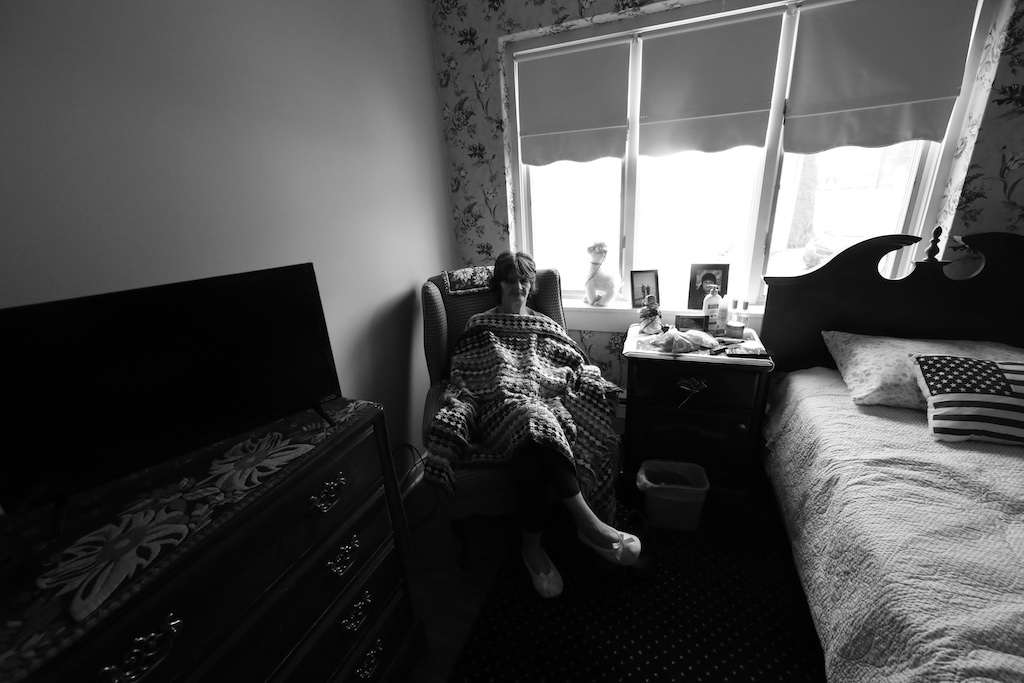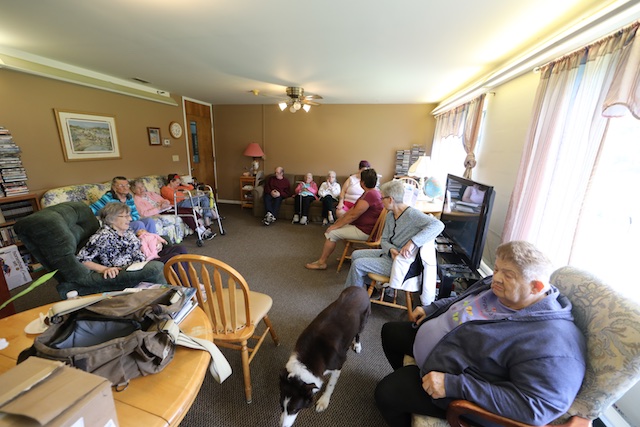At The Mansion, inspired by the writing of Gabriel Garcia Marquez and a half-dozen other writers, we sat in the Activity Room of The Mansion for my weekly story reading to the Mansion residents.
It was pouring outside, the room was warm, the rain beating on the windows, the sky back with thunder clouds, the residents still excited by the appearance of an otter in the creek behind the building.
I decided to take them to different places today, we went to the little village of Macondo in Marquez’s magical One Hundred Years Of Solitude, a book I never imagined reading to these good people on the edge of life, most of them raised on the farms or small villages of upstate New York.
In todays, chapter, Ursula lost her patience with her feckless husband Jose Arcadio Buendia, who kept spending all their money on the inventions brought to town by the mysterious aging gypsy Melquidiades who was Buendia’s age, but who aged mysteriously.
“It was,” wrote Marquez – the residents were transfixed – “in reality, the result of multiple and rare diseases contracted on his innumerable trips around the world. He was a fugitive from all the plagues and catastrophes that had ever lashed mankind. he had survived pellagra in Persia, scurvy in the Malayan archipelago, leprosy in Alexandra, beriberi in Japan, bubonic plague in Madagascar, an earthquake in Sicily, an a disastrous shipwreck in the Strait of Magellan.
Ursala was sick of the gypsy’s annual appearances in Macondo. Every year, her husband gave him all of their food money for the new inventions he brought, thinking they would bring wealth, but they only brought more poverty.
After we left Macondo, I read an inventive animal story, The Someone New, by Jill Twiss and Eg Keller about how otters and ducks and butterflies accepted a newcomer, a snail named Pudding, after rejecting him out of fear things would change.
The residents related to that story, as Heather from the Battenkill bookstore knew they might. When I came into the bookstore for my weekly pre-reading visit, she usually has a new book for me to read to the residents.
We talked about the fear of something new, in terms of coming to a place like the Mansion, or welcoming new people.
We went with Maisie the border collie puppy to Moonrise Farm, where she yearned to have a job and studied patiently under the watchful eye of Laddie, the older sheep dog.
The book – by John and Jennifer Churchman – has the most wonderful pictures of the dogs and farm animals, the residents oohed and aaahed and smiled as I walked the book around to them as I read it so they could see the photos.
I read a great favorite, the Wonky Donkey by Craig Smith, they laugh at me and the wonky donkey fun plays on words. They always clap and laugh when they hear it. The residents love the ridiculous and the absurd.
I read some of Shel Silverstein’s oddball poems (Where The Sidewalk Ends) – Madeline observed that he had a Jewish name, she knew that from living in New York. When I left, Madeline thanked me and asked me what my name was.
She will not remember it for a minute. She always tells me that Red’s collar is too tight, I always loosen it so she can see.
And I read a Native American story, The Girl and the Wolf by Katherena Vermette, about a nameless girl who wanders off from her mother and gets lost in the woods. She is wandering frightened in the dark when a big silver wolf appears and asks her if she is lost.
We all tensed up – I could feel the anxiety in the room – but it turned out the wolf always guided lost children home when he found them, and encouraged them to use their instincts to make their way.
The girl trusted him from the beginning.
It was in a sense, the perfect Mansion story, the residents all expect one kind of ending, and are relieved and surprised to find another.
We talked about wolves, and they said they have never heard a happy story about a wolf and a child. Happy endings are important to them.
I am always a bit anxious when I read to the residents, I worry that I am boring, or am picking the wrong books. and several people always fall asleep. Some, confused, talk over me. Others comment on the stories. A few are rapt, they never take their eyes off of me.
I bring a new story every week, I am learning what to choose.
But here’s my happy ending.
When I got up to pack up my books – I feel like one of those traveling story tellers in medieval times – there was applause! They were clapping for me, and thanking me, they loved the stories they heard today, the mix, the twists and turns, the journeys to other places.
Marquez, as it turns out, is the perfect author for the Mansion residents, his stories are full of magic and mysticism, things they love to hear about but have usually never experienced.
So are the farm and animal stories, especially those with beautiful pictures and drawings.
I love this work, we go to different places every week. It’s like taking a magical trip, we all step ourselves to other places. I’ve got to read more slowly and with more feeling, I think.
This is a kind of acting.
I’ve done scores of reading and public appearances, and heard lots of applause. But I don’t think I ever got applause that was as sweet as the applause I got today at the Mansion.
Please consider supporting this work with the elderly. You can contribute via Paypal, [email protected] or by check and small donations: Jon Katz, Mansion Work, P.O.Box 205, Cambridge, N.Y., 12816.





